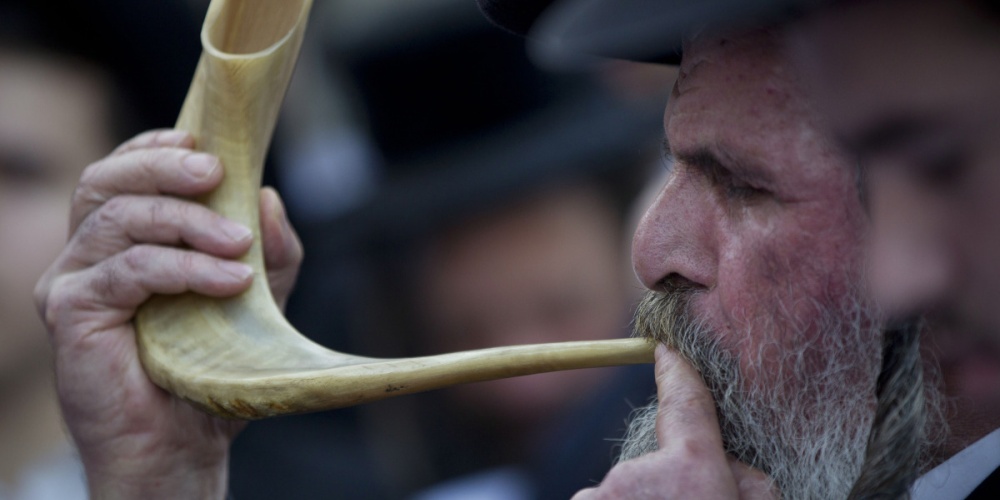
Rosh Hashanah is first and foremost a day of prayer. Prayer, as Rav Soloveitchik often noted, is rooted in asking G-d to fulfil our needs. One who is fully satisfied with his life has no need to pray.
As the Yom haDin, the Day of Judgment, approaches, our needs and thus, the amount of time spent in prayer grows—such that on Yom Kippur, when our fate is sealed, the entire day is spent in prayer. The Torah readings on Rosh Hashanah focus on Abraham, the originator of Jewish prayer. The haftarah for the first day of Rosh Hashanah deals with the heartfelt prayers of Hannah, whose method of prayer is the model that Judaism sees as the ideal prayer paradigm (see Brachot 31a): outwardly silent, inwardly introspective and intensely focused, to the point of shutting out all distractions as we beseech G-d. The haftarah for the second day describes our matriarch Rachel "crying (i.e., praying) for her children".
The shofar is an instrument of prayer, thereby explaining why it is blown in the middle of the amidah. It is prayer without words, demonstrating our inability to fully articulate our deepest needs. We turn to G-d and hope and pray that G-d, as our parent, understands our sounds of calling unto Him like a mother who hears and understands the cries of her baby.
It is this correlation of our needs with prayer that, it seems to me, makes prayer so difficult for modern man. Living in such comfort, with unprecedented wealth and time to enjoy it, modern man often feels little is lacking. And when problems do arise, our mastery of science and technology or even the social sciences will help us deal with and overcome our challenges. Who needs to pray in such an environment? Yet we do need to pray, and to pray often.
The Torah describes Rosh Hashanah not as the New Year, but as Yom Teruah, translated into Aramaic as a yom yevavah, a day of crying. The inarticulate and heartfelt prayer as we cry out to G-d through the sounds of the shofar is the essence of Rosh Hashanah. The shofar sounds themselves, in trying to induce us to call out to G-d, represent different forms of crying: sighing, shevarim, wailing, truah, or a combination of both, shevarim-truah.
Thankfully, for most of us, crying is not something we do naturally or often. Our ability to laugh and take life not nearly as seriously as many of our ancestors had to makes the sound of the shofar that much more difficult to hear.
The fusion of shofar and prayer reflects itself throughout the yamim noraim and all year long. Prayer, our sages teach, is most optimally done b'tzibbur, in a congregation of other Jews. This is so, not only because devarim shebikedusha can be said only in the presence of a minyan, but because the prayer of a community differs fundamentally from that of an individual. Approaching G-d alone with our myriad of sins and shortcomings is a very daunting task indeed. Approaching as a member of the covenantal community allows us, as Rav Soloveitchik explains, to demand G-d be more receptive to our prayers. Interestingly, Jewish law stipulates that the shofar be blown during the amidah only in the presence of a minyan. A Jew davening alone on Rosh Hashanah would not blow the shofar in the middle of his/her "private" amidah.
If we are to ask G-d to forgive our sins, then it is incumbent on us that we forgive others. Hence, Jewish law demands we daven with all types of Jews—something sorely lacking in many of our shuls. Insightfully, our Sages teach us, "a fast day without the sinners of Israel is not a fast day” (Kritot 6b).
We grow spiritually by being exposed to and davening with those of differing perspectives. The Ramban claims that the actual biblical obligation of prayer is operative only if confronted with an et tzara, a time of need. But when we have those needs—and we have them each and every day—the biblical obligation mandates that we daven with a minyan (see Ramban's comments to positive mitzva #5 in the Rambam's Sefer Hamitzvot). We can tackle our problems only if we come together as a people.
We may and must have our disagreements, represented by the broken sound of the shevarim and truah, but they must be surrounded by the long unified sound of the tekiah. "And when you gather together the people, titka’u, you shall blow"(Bamidbar 10:7). May we learn to truly hear the sounds of the shofar so that we will merit the words of the prophet, "May the Lord G-d wipe away tears from every face" (Isaiah 25:8).
AP Photo/Bernat Armangue



